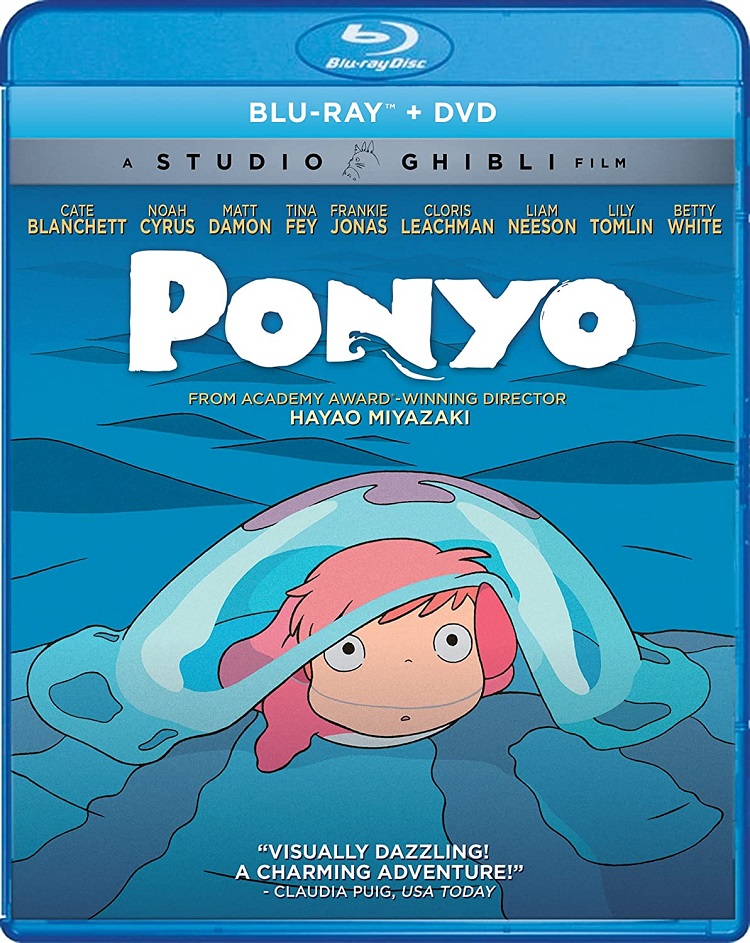
There is nothing like a Hayao Miyazaki movie. Released in 2008, Ponyo was the tenth film Miyazaki directed (his eighth for Studio Ghibli). To celebrate its tenth anniversary, GKIDS and Fathom Events gave it a limited theatrical run.
A small goldfish wanders off from her four-flippered home, narrowly escapes a fishing trawler dredging up piles of garbage from the bottom of the sea, and gets stuck inside a glass jar. She is rescued by Sosuke, a five-year-old boy who places her in a bucket and shows her off to his mom and the old ladies at the retirement home where his mom works. When the fish (called Brunhilde by her dad, but dubbed Ponyo – because it sounds like “Squishy” in Japanese or so says the trivia that played before the film – by Sozuke) licks the blood from a wound on Sozuke’s finger, she turns into a little girl with magical powers. By moving from the sea to the human world, Ponyo causes a great tsunami.
Miyazaki’s imagination seems limitless. Consider the opening scene in which we plunge into the ocean and are mesmerized by thousands of jellyfish, all 1,600 of which were hand drawn and individually animated. Marvel at all of the ancient fish that populate the flooded landscape and serve no narrative purpose, seeming to exist solely to delight Miyazaki and his audience. Gasp with joy when the oceans waves turn into giant fish that leap against the shore during a storm.
The story gleefully rips off Hans Christian Anderson’s story The Little Mermaid with helpings of Wagner thrown in for good measure (the score teases “Ride of the Valkyries” when those giant fish are skittering across the sea). It is fairly simple plotwise, easy to follow by children, yet it plays like poetry, it sings like a psalm.
As a father, I appreciate that Miyazaki’s characters are are so very often kind-hearted, generous of spirit, and gentle-natured. Sozuke and Ponyo are playful, intelligent and resourceful, but never bratty. The mother takes Ponyo’s sudden appearance into her life, and her apparent magical nature in stride. She welcomes her into her home, dries the rain from her hair, and fixes her a cup of tea. The elderly women in the nursing home are filled with curiosity and kindness. Even Ponyo’s father, who at first seems like a villain, becomes a much more interesting hero of sorts. He was human once, before becoming the caretaker of the sea, and now is disgusted by all the waste humans throw into the ocean. His anger in the early scenes stem from fearing that the humans have kidnapped Ponyo and will destroy her.
Like a lot of Miyazaki films, I was not particularly fond of Ponyo when I first watched it ten years ago. His films are so strange, so unlike what we know of as animated films, that it always takes me a couple of viewings to get on his wavelength. But with each showing, I come to love his films more and more.
Also included in my viewing was the amusing animated short film from France, Funny Fish. It’s about a group of fish who think a floating red balloon is another fish in need of rescuing.
Ponyo‘s theatrical run is now over, but it was just the beginning of the 2018 Studio Ghibli Fest put on by GKIDS and Fathom Events. Over the course of 2018, they will be running eight more of the famed studio’s films. .